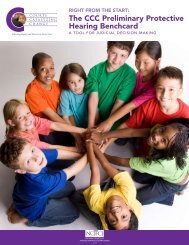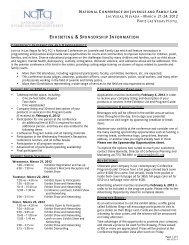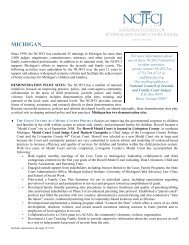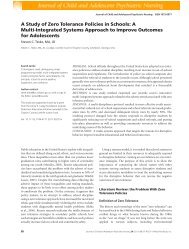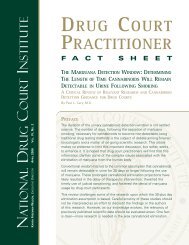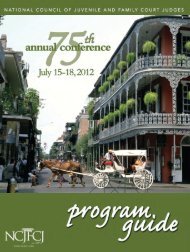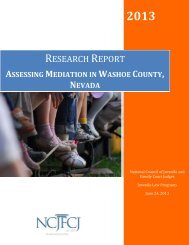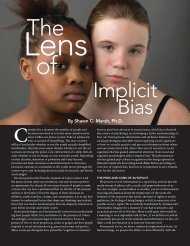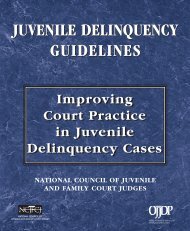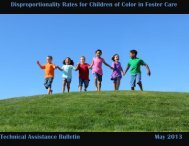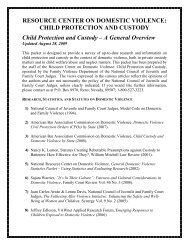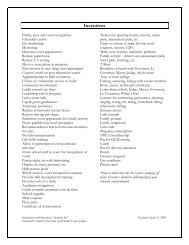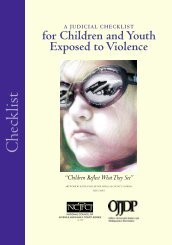EDUCATION UNDER ARREST: - Justice Policy Institute
EDUCATION UNDER ARREST: - Justice Policy Institute
EDUCATION UNDER ARREST: - Justice Policy Institute
- No tags were found...
You also want an ePaper? Increase the reach of your titles
YUMPU automatically turns print PDFs into web optimized ePapers that Google loves.
<strong>EDUCATION</strong> <strong>UNDER</strong> <strong>ARREST</strong> 19was 1 percent less likely to be arrestedwithin three years. 64• A 2011 Council of State Governmentsstudy of seventh grade students in Texasover three graduated classes found thatsuspensions or expulsions betweenseventh and twelfth grades increased thechances that a student would repeat agrade, leave school or enter the justicesystem. 65A student may be suspended or expelled as aresult of an arrest, even if the charges are laterdropped or the student is never confined to ajuvenile justice facility. Increased suspensionsand expulsions, and the harm they causestudents, are another negative consequence ofincreased law enforcement presence in schoolsthat should be taken into account byadministrators.SROs disrupt learningStudents learn best when they are in a safeenvironment and are not fearful. 66 Research alsoindicates that fear of bullying is associated withmissed school. 67 While this line of argument isusually used to argue for SROs and tightenedsecurity measures that prevent bullying andschool violence, there is evidence that SROscreate the fearful environment that they aresupposed to prevent. Perhaps more importantly,the involvement of SROs in schools precludesthe option for teachers and faculty to use conflictto teach students how to resolve differencespeacefully.In some schools, there is a cycle of perceivedhostility between SROs and students. Schoolresource officers who view students withsuspicion and as potential criminals can causethe students to also act with hostility, suspicion,and mistrust toward the SROs. Such a cycle ofantagonism could cause more incidents ofviolence and the opportunity for SROs tooverreact resulting in more arrests. 68Additionally, some school resource officers maybe engaging in violent and aggressive behavior.The Advancement Project has collected examplesof students feeling harassed by school resourceofficers. In Philadelphia, surveys and interviewswith parents and youth by Youth United forChange and the Advancement Project foundnumerous examples of abuse and policeSCHOOL TO PRISON PIPELINEThe “School to Prison Pipeline” and similar concepts are used to describe how some youth are seeminglyon a one-way path that begins with becoming disconnected with school, then continues to dropping out,and later entering the justice system. School policies that rely on overly punitive responses to studentbehavior and a reliance on law enforcement to address school discipline have led to increases insuspensions, expulsions, and referrals to the juvenile justice system for even minor infractions. As a result,students are taken out of school, missing important educational opportunities and, in some cases, madeunable to return to school. The School to Prison Pipeline not only sends students directly into the justicesystem, but missed educational opportunities are linked to increased risk that a student will one day beinvolved in the justice system.Perhaps most concerning is that the School to Prison Pipeline most affects youth of color, who are morelikely to be suspended or expelled and arrested outside of school or, in some jurisdictions, in school, havelower levels of educational attainment, and are more likely to go to prison than their white counterparts.For more information about this issue, visit:• Advancement Project Schoolhouse to Jailhouse Track: www.stopschoolstojails.org/• School to Prison Pipeline: www.schooltoprison.org• Children’s Defense Fund Cradle to Prison Pipeline: www.childrensdefense.org/programscampaigns/cradle-to-prison-pipeline/



